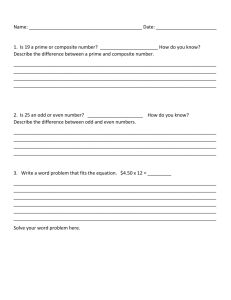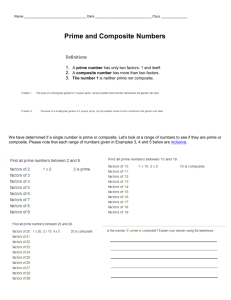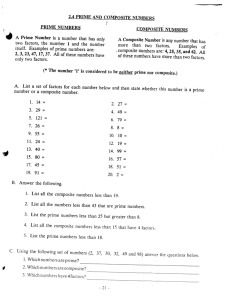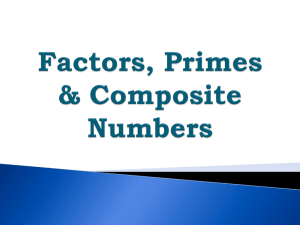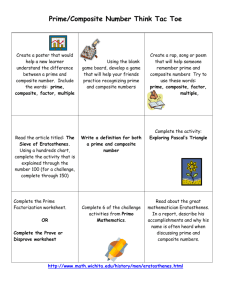Confident ______Ok ______Lost
advertisement
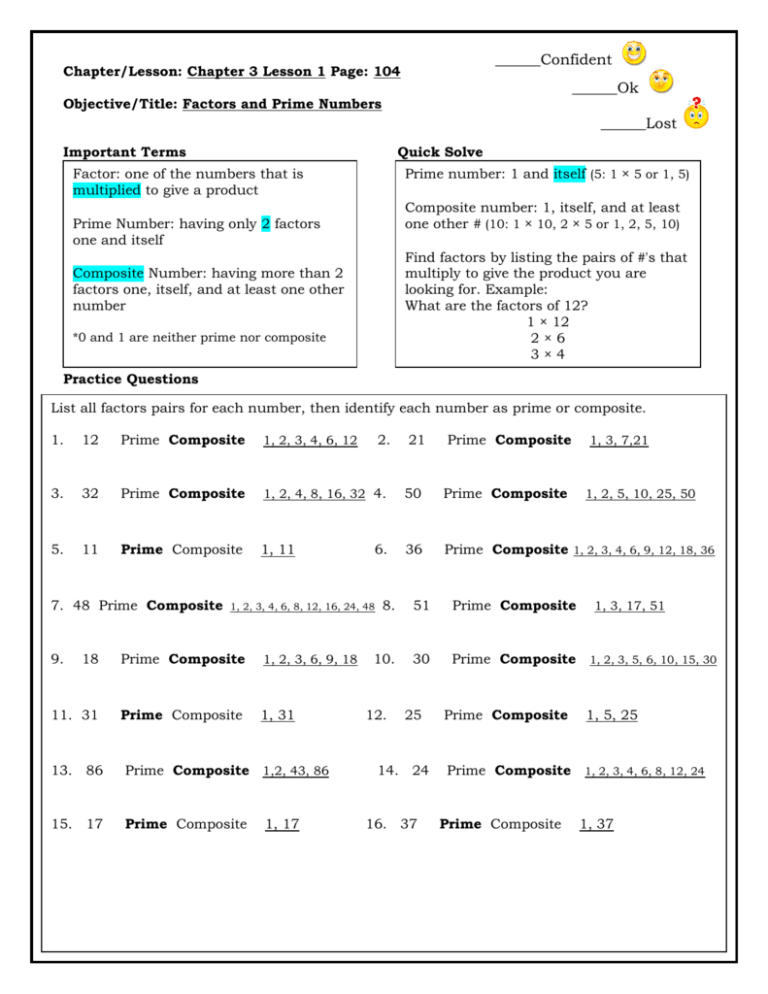
______Confident Chapter/Lesson: Chapter 3 Lesson 1 Page: 104 ______Ok Objective/Title: Factors and Prime Numbers ______Lost Important Terms Quick Solve Factor: one of the numbers that is multiplied to give a product Prime number: 1 and itself (5: 1 × 5 or 1, 5) Composite number: 1, itself, and at least one other # (10: 1 × 10, 2 × 5 or 1, 2, 5, 10) Prime Number: having only 2 factors one and itself Find factors by listing the pairs of #'s that multiply to give the product you are looking for. Example: What are the factors of 12? 1 × 12 2×6 3×4 Composite Number: having more than 2 factors one, itself, and at least one other number *0 and 1 are neither prime nor composite Practice Questions List all factors pairs for each number, then identify each number as prime or composite. 1. 12 Prime Composite 1, 2, 3, 4, 6, 12 3. 32 Prime Composite 5. 11 Prime Composite 7. 48 Prime Composite 9. 2. 21 Prime Composite 1, 2, 4, 8, 16, 32 4. 50 Prime Composite 1, 11 36 Prime Composite 1, 2, 3, 4, 6, 9, 12, 18, 36 6. Prime Composite 1, 2, 3, 6, 9, 18 11. 31 Prime Composite 1, 31 13. 86 Prime Composite 1,2, 43, 86 15. 17 Prime Composite 1, 17 1, 2, 5, 10, 25, 50 8. 51 Prime Composite 10. 30 Prime Composite 1, 2, 3, 5, 6, 10, 15, 30 1, 2, 3, 4, 6, 8, 12, 16, 24, 48 18 1, 3, 7,21 12. 25 14. 24 16. 37 Prime Composite 1, 3, 17, 51 1, 5, 25 Prime Composite 1, 2, 3, 4, 6, 8, 12, 24 Prime Composite 1, 37 Notes and Examples Using the Sieve of Eratosthenes (a mathematician who developed this process), we can identify all prime numbers from 1-100 *1 is neither prime nor composite *Prime numbers are circled *Composite numbers are crossed off 1 2 3 4 5 6 7 8 9 10 11 12 13 14 15 16 17 18 19 20 21 22 23 24 25 26 27 28 29 30 31 32 33 34 35 36 37 38 39 40 41 42 43 44 45 46 47 48 49 50 51 52 53 54 55 56 57 58 59 60 61 62 63 64 65 66 67 68 69 70 71 72 73 74 75 76 77 78 79 80 81 82 83 84 85 86 87 88 89 90 91 92 93 94 95 96 97 98 99 100 Prime Number: 5 is prime because only 2 numbers can be multiplied together to get a product of 5 (1 × 5 = 5.) You can't multiply any other numbers together and get a product of 5. This means that 1, 5 are the only factors of 5. Composite Number: 4 is composite because you can multiply 1 × 4 to get a product of 4, also 2 × 2 to get a product of 4. This means that 1, 2, 4 are all factors of 4. 18
